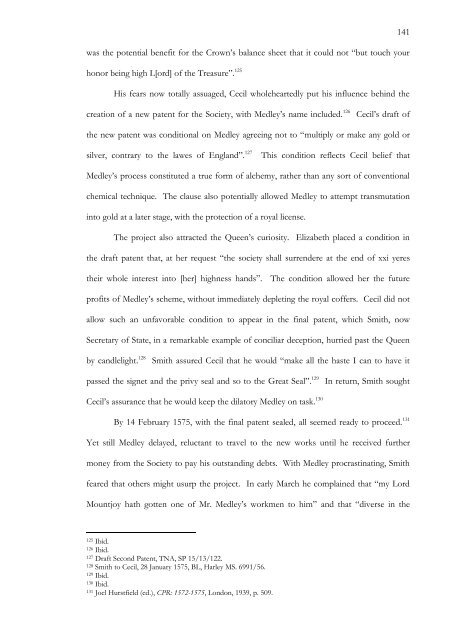The Alchemical Patronage of Sir William Cecil, Lord Burghley
The Alchemical Patronage of Sir William Cecil, Lord Burghley
The Alchemical Patronage of Sir William Cecil, Lord Burghley
You also want an ePaper? Increase the reach of your titles
YUMPU automatically turns print PDFs into web optimized ePapers that Google loves.
was the potential benefit for the Crown‘s balance sheet that it could not ―but touch your<br />
honor being high L[ord] <strong>of</strong> the Treasure‖. 125<br />
His fears now totally assuaged, <strong>Cecil</strong> wholeheartedly put his influence behind the<br />
creation <strong>of</strong> a new patent for the Society, with Medley‘s name included. 126 <strong>Cecil</strong>‘s draft <strong>of</strong><br />
the new patent was conditional on Medley agreeing not to ―multiply or make any gold or<br />
silver, contrary to the lawes <strong>of</strong> England‖. 127 This condition reflects <strong>Cecil</strong> belief that<br />
Medley‘s process constituted a true form <strong>of</strong> alchemy, rather than any sort <strong>of</strong> conventional<br />
chemical technique. <strong>The</strong> clause also potentially allowed Medley to attempt transmutation<br />
into gold at a later stage, with the protection <strong>of</strong> a royal license.<br />
<strong>The</strong> project also attracted the Queen‘s curiosity. Elizabeth placed a condition in<br />
the draft patent that, at her request ―the society shall surrendere at the end <strong>of</strong> xxi yeres<br />
their whole interest into [her] highness hands‖. <strong>The</strong> condition allowed her the future<br />
pr<strong>of</strong>its <strong>of</strong> Medley‘s scheme, without immediately depleting the royal c<strong>of</strong>fers. <strong>Cecil</strong> did not<br />
allow such an unfavorable condition to appear in the final patent, which Smith, now<br />
Secretary <strong>of</strong> State, in a remarkable example <strong>of</strong> conciliar deception, hurried past the Queen<br />
by candlelight. 128 Smith assured <strong>Cecil</strong> that he would ―make all the haste I can to have it<br />
passed the signet and the privy seal and so to the Great Seal‖. 129 In return, Smith sought<br />
<strong>Cecil</strong>‘s assurance that he would keep the dilatory Medley on task. 130<br />
By 14 February 1575, with the final patent sealed, all seemed ready to proceed. 131<br />
Yet still Medley delayed, reluctant to travel to the new works until he received further<br />
money from the Society to pay his outstanding debts. With Medley procrastinating, Smith<br />
feared that others might usurp the project. In early March he complained that ―my <strong>Lord</strong><br />
Mountjoy hath gotten one <strong>of</strong> Mr. Medley‘s workmen to him‖ and that ―diverse in the<br />
125 Ibid.<br />
126 Ibid.<br />
127 Draft Second Patent, TNA, SP 15/13/122.<br />
128 Smith to <strong>Cecil</strong>, 28 January 1575, BL, Harley MS. 6991/56.<br />
129 Ibid.<br />
130 Ibid.<br />
131 Joel Hurstfield (ed.), CPR: 1572-1575, London, 1939, p. 509.<br />
141















